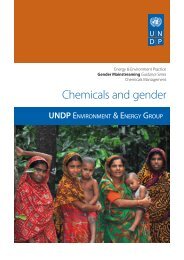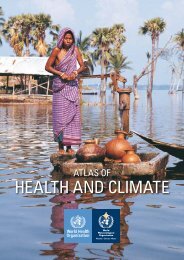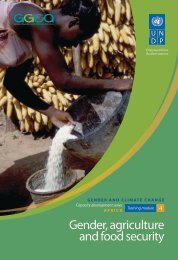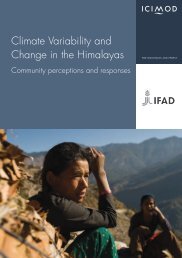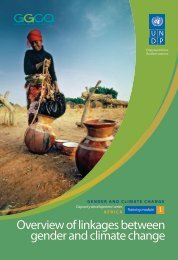jotoafrika - Gender Climate
jotoafrika - Gender Climate
jotoafrika - Gender Climate
You also want an ePaper? Increase the reach of your titles
YUMPU automatically turns print PDFs into web optimized ePapers that Google loves.
Most women walk for long distances in search of firewood<br />
© e-iwm.wikispaces.com, 2003<br />
Vulnerability to climate change is<br />
complex. It is shaped by social,<br />
economic, ecological, institutional,<br />
technological and governance<br />
processes. <strong>Climate</strong> change also impacts<br />
on men and women in rural areas.<br />
As the climate changes, the exposures<br />
and risks people face also change.<br />
Experiences of current exposure to climaterelated<br />
hazards suggest women are more<br />
vulnerable than men. But historically, both<br />
men and women have particular social<br />
disadvantages that make them vulnerable<br />
to climate change.<br />
Research conducted in rural communities<br />
in Namibia shows that the different impacts<br />
experienced by men and women arise<br />
from the unequal distribution of roles and<br />
responsibilities. The research focused<br />
on two communities: Epyeshona village<br />
in northern-central Namibia and Daures<br />
Constituency in the north-western region.<br />
People in Namibia’s rural settings have<br />
strong links to the environment and climaterelated<br />
variables. The communities in<br />
Epyeshona that practice subsistence crop<br />
and livestock farming have a stronger link<br />
to the environment and are more affected<br />
Do you want to be a guest<br />
editor for Joto Afrika? Future<br />
issues will look at climate<br />
change and pastoralism, and<br />
climate change and energy.<br />
Send us your CV and cover letter –<br />
contact details are on page 8.<br />
by climate than those in Daures. An activity<br />
profile assessment revealed that women<br />
in this area interact with the environment<br />
more than men because they are expected<br />
to maintain household food security. They<br />
have to farm, go to the market, and fetch<br />
water and firewood.<br />
The environment in Daures is drier. The<br />
availability of rangelands for grazing is a<br />
key environmental variable in this area.<br />
Livestock rearing, the main source of<br />
livelihood, is mostly done by men hence<br />
they are comparatively more affected by<br />
effects of climate change.<br />
However, women lack technical skills to<br />
participate in formal employment and<br />
therefore engage more in informal economic<br />
activities such as collecting water and fuel<br />
wood. These are also negatively impacted<br />
by climate change. The environmental<br />
conditions in Daures do not offer many<br />
opportunities for women to participate<br />
beyond their household chores.<br />
Responses to climate change variability<br />
As the climate changes and affects<br />
livelihoods, men and women in the two<br />
communities are adapting in different ways<br />
because crop and livestock farming their<br />
main livelihoods are compromised.<br />
Women in Epyeshona village engage in<br />
basketry, processing of marula nuts and<br />
oil and selling chickens, pigs or goats.<br />
In Daures, farmers are starting to mine<br />
semi-precious stones on a small-scale<br />
basis. Women assist men by selling<br />
semi-precious stones to tourists.<br />
Recommendations<br />
There is a need to understand the historical<br />
and social disadvantages of both men and<br />
women, and how these affect their ability<br />
How gender<br />
affects<br />
vulnerability to<br />
climate change<br />
in rural Namibia<br />
Research summary<br />
to cope with current climate variability. This<br />
will impact on their ability to adapt and build<br />
resilience to climate change.<br />
Government officials and decisionmakers<br />
need to ensure that rural<br />
women are also involved in decisionmaking.<br />
This will lead to more<br />
successful programmes that enable<br />
rural communities to build resilience to<br />
adverse climatic conditions.<br />
Both men and women need support to<br />
empower them to excel in agriculture.<br />
They require appropriate labour-saving<br />
technology, seeds that can withstand<br />
different climatic conditions, and<br />
financial capital.<br />
People in Epyeshona village should<br />
diversify into more income-generating<br />
activities such as sewing, brick-making<br />
and selling crafts items.<br />
Margaret Angula<br />
Department of Geography and<br />
Environmental Studies, University of<br />
Namibia, Private Bag 13301, Windhoek,<br />
Namibia<br />
Tel +264 61 2063716<br />
mangula@unam.na<br />
margaret.angula@gmail.com<br />
This research project was supported by<br />
Heinrich Boll Foundation<br />
See also<br />
<strong>Gender</strong> and <strong>Climate</strong> Change: Namibia<br />
Case Study, Heinrich Böll Foundation<br />
Southern Africa, Margaret Angula, 2010<br />
http://bit.ly/hqGEb3<br />
Page 5



